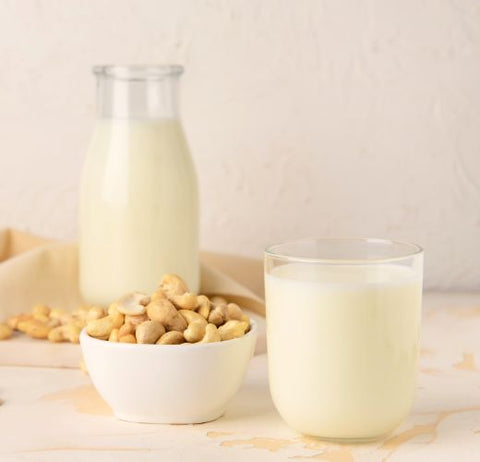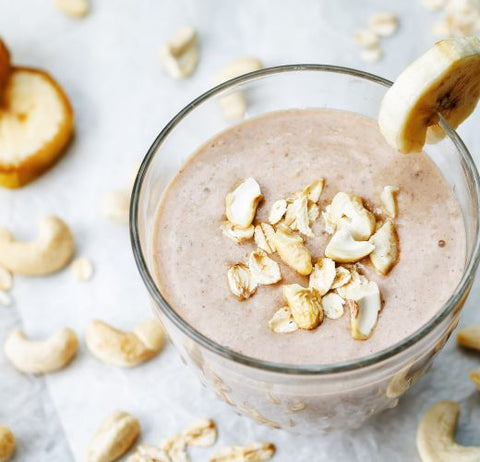Unveiling The Goodness Of Cashew Milk: Benefits, Recipes And More
Introducing Cashew Nut Milk
Delicious cashew milk, a plant-based alternative to traditional dairy has surged in popularity in recent years. Captivating the taste buds of the health-conscious and those with dietary needs. Derived from cashew nuts, this creamy drink offers a rich and indulgent flavour, making it a versatile substitute for cow’s milk in a wide variety of recipes.
Cashew nut milk boasts high nutritional value, providing essential vitamins and minerals. It is full of nutrients like calcium and vitamin D that match the nutritional content of traditional dairy. This dairy-free option is also lactose-free, making it suitable for people with lactose intolerances. It is also lower in calories and saturated fats compared to full cream cow’s milk, making it one of the best choices for those seeking lighter alternatives.
Rich in heart-healthy monounsaturated fats and antioxidants, cash nut milk can contribute to cardiovascular health and reduce oxidative stress. Additionally, its inclusion of vitamins E and K, as well as minerals such as magnesium and phosphorus will support your overall health and well-being so you can feel the difference.

Cashew Milk Vs Other Nut Milks
In the realm of nut milk alternatives, cashew milk stands out as a unique and flavourful option. When compared to other nut milk varieties like almond, soy, or coconut, cashew nut milk brings distinctive qualities to the table. While almond milk is renowned for its lightness and versatility, cashew milk offers a creamier consistency, making it an ideal choice for those seeking a richer and more indulgent flavour.
Cashew nut milk also sets itself apart in terms of texture, boasting a smooth and silky mouthfeel that contributes to its appeal in various culinary applications. This makes it an excellent addition to coffee, cereals, and smoothies, enhancing the overall taste experience. Additionally, cashew milk tends to have a milder taste compared to almond or soy milk, making it a versatile base for both sweet and savory dishes.

The Nutritional Bounty Of Cashew Milk
Cashew milk brings a wealth of nutritional benefits to the table, enhancing its appeal for those seeking a well-rounded and balanced diet. Rich in essential vitamins and minerals, cashew milk serves as a nutrient powerhouse. It contains notable amounts of vitamins E and K, promoting skin health. These vitamins contribute to overall well-being and support bodily functions.
Moreover, cashew milk is a good source of minerals like magnesium and phosphorus. Magnesium plays a crucial role in muscle and nerve function, while phosphorus contributes to bone health and energy metabolism. The combination of these minerals further enhances the nutritional profile of cashew milk, making it a valuable addition to a balanced diet.
The heart-healthy monounsaturated fats found in cashew milk offer potential benefits for cardiovascular health, helping to manage cholesterol levels and reduce the risk of heart disease. Additionally, its antioxidant content aids in combating oxidative stress, contributing to the overall maintenance of a healthy body.
Incorporating cashew milk into one’s diet provides a dairy-free alternative that not only caters to individuals with lactose intolerance but also contributes to a diverse and nutrient-rich eating plan. As part of a well-balanced diet, cashew milk offers a delicious and health-conscious option for those looking to prioritise both taste and nutritional value.
Cashew Milk Benefits For Your Well-Being

Cashew milk offers a range of health benefits, making it a nutritious choice that contributes to overall well-being.
Heart Health: The monounsaturated fats in cashew milk are heart-healthy, helping to manage cholesterol levels and reduce the risk of cardiovascular diseases. These fats, along with antioxidants, contribute to a healthier cardiovascular system by promoting better blood circulation and reducing inflammation.
Bone Strength: Cashew milk is a source of essential minerals like phosphorus and magnesium, both vital for maintaining strong and healthy bones. Phosphorus plays a key role in bone mineralization, while magnesium supports bone density and helps prevent osteoporosis. Including cashew milk in your diet can contribute to optimal bone health.
Overall Wellbeing: The vitamins found in cashew milk, including vitamin K and vitamin E, play crucial roles in the body. Vitamin K supports bone health while vitamin E acts as an antioxidant and protecting cells. These vitamins, along with other nutrients in cashew milk contribute to a robust immune system and overall well-being.
Incorporating cashew milk into your diet provides not only a delicious dairy alternative but also a wholesome option that supports heart health, bone strength, and overall vitality.
Making Cashew Milk At Home

Here’s a simple step-by-step guide:
Ingredients: Gather 1 cup of raw cashews, 4 cups of water and optional sweeteners such as vanilla extract, maple syrup or dates for flavour.
Soaking: Begin by soaking the raw cashews in water overnight. This softens the cashews and makes them easier to blend resulting in a smoother milk.
Rinsing: After soaking, drain and rinse the cashews thoroughly.
Blending: Combine the soaked cashews and 4 cups of fresh water in a blender. If desired, add a sweetener or flavourings. Blend on high speed until the mixture becomes smooth and creamy.
Straining: To remove the pulp, strain the blended mixture through a nut milk bag, cheesecloth, or fine mesh sieve into a bowl or jug. Squeeze or press the pulp to extract as much liquid as possible.
Storage: Transfer the strained cashew milk into a clean container and refrigerate. Shake well before use, as homemade cashew milk may naturally separate.
Enjoy: Making cashew milk at home will allow you to enjoy it in coffee, cereal, smoothies, or any recipe that calls for milk. This recipe can also be used for almond milk and macadamia milk. Check out these other milks such as almond milk here.
Cashew Milk Recipe Extravaganza
Cashew milk’s versatility extends beyond its basic use as a dairy alternative. Embrace the creamy texture and subtle nutty flavour of a cashew milk recipe in a wide range of both sweet and savoury dishes.
Gold Turmeric Latte: Combine cashew milk with turmeric, ginger, and a touch of honey for a golden latte. This warming beverage not only delights the senses but also offers potential anti-inflammatory benefits.
Cinnamon Maple Pancakes: Level up your pancake batter by swapping regular milk with cashew milk. Add a hint of cinnamon and a drizzle of maple syrup for a breakfast that’s both fluffy and flavorful.
Creamy Garlic Alfredo Sauce: Elevate your pasta game with a dairy-free Alfredo sauce. Blend cashew milk with garlic, a tablespoon of corn flour, and a splash of lemon juice for a rich velvety sauce.
Berry Cashew Bowl: Blend cashew milk with mixed berries, banana, and a handful of spinach for a vibrant and nutrient-packed smoothie bowl. Top with granola, nuts, and fresh fruit for added crunch and sweetness.
Mushroom Cashew Risotto: Create a decadent mushroom risotto by using cashew milk to achieve a creamy consistency. The nutty undertones enhance the earthy flavours of the mushrooms.
Chai Spiced Rice Pudding: Infuse cashew milk with chai spices and use it to cook a comforting rice pudding. This aromatic dessert combines the creaminess of cashew milk with the warmth of chai.
A cashew milk recipe is adaptable to both sweet and savoury dishes that open up a world of endless culinary possibilities, allowing you to experiment and savour its rich, velvety flavours in diverse and delightful ways.

Cashew Milk And Your Culinary Adventures
Cashew milk, with its velvety texture and subtle nutty taste, has become a go-to recipe base, elevating dishes across cooking, baking and drinks.
Cooking: Cashew milk excels as a dairy alternative in cooking, seamlessly integrating into savoury dishes. Its creamy consistency makes it a versatile ingredient in soups, curries, and sauces, imparting richness without overpowering flavours. Try it in creamy pasta sauces or hearty stews for a luscious touch.
Baking: In the realm of baking, cashew milk emerges as a superstar. Its thickness and richness enhance the moisture content in baked goods, resulting in soft and indulgent treats. Use it in cakes, muffins, and cookies to achieve a tender crumb and a delightful flavour. Cashew milk’s mid taste allows it to complement various sweet recipes without overshadowing other ingredients.
Drinks: Cashew milk’s luxurious texture makes it an excellent choice for crafting creamy beverages. From lattes to smoothies, it blends seamlessly, adding a touch of decadence. Its ability to froth makes it a favourite for coffee enthusiasts seeking dairy-free cappuccinos or lattes. The creamy consistency also shines in refreshing smoothies, where it enhances the overall mouthfeel.
Whether you’re aiming for a savoury depth in your culinary creations, a moist crumb in your baked goods, or a luxurious texture in your beverages, cashew milk stands as a versatile and flavourful ingredient that elevates a wide array of recipes.
Caju Milk Vs Kaju Milk: Exploring Regional Variations
Cashew milk is known by various regional names, such as “Caju Milk” in Portuguese-speaking regions and “Kaju Milk” in areas influenced by Hindi. This not only showcases its diverse cultural and linguistic history but its use across a wide variety of recipes around the world.
In Portuguese-speaking countries, particularly in Brazil, the term “Caju Milk” directly refers to cashew milk. Brazil, being a major producer of cashews, incorporates this nut-based milk into its traditional recipes. Brazilian cuisine celebrates the creamy texture of Caju Milk in various dishes, from desserts to savoury meals.
In Hindi-speaking regions, the term “Kaju Milk” similarly denotes cashew milk. India, a significant cultivator of cashew nuts, incorporates Kaju Milk into both traditional and modern recipes. Given the diverse regional cuisines across India, the usage of Kaju Milk can vary. In Indian cuisine, it finds its way into traditional sweets, spicy curries and refreshing beverages, showcasing the adaptability of cashew milk across diverse dishes.
The regional names for cashew milk reflect not only linguistic diversity but also the unique cultural contexts and culinary traditions that have embraced this dairy alternative, adding a touch of flavour to a wide range of recipes across the globe.

Tips For Making The Perfect Cashew Milk
Achieving the perfect cashew milk involves attention to detail and a few handy tips to overcome common challenges to ensure a smooth and delicious outcome.
Proper Soaking: To achieve a creamy texture, ensure cashews are soaked adequately. Soak them for at least 4 hours, or preferably overnight. This softens the nuts, making them easier to blend and resulting in a silkier milk.
Blending Techniques: Invest in a high-quality blender for the best results like the Optimum 9200a 2nd Generation, Optimum G2.6 Slim Platinum Series and Optimum 9400x. Blend the soaked cashews with water and blend on high speed. This ensures a thorough and smooth blend and prevents graininess.
Straining Process: Use a nut milk bag, cheesecloth, or a fine mesh sieve for straining. Squeeze or press the mixture well to extract maximum liquid, leaving behind minimal pulp. For a creamier texture, double-strain if necessary.
Flavour Enhancements: Customise your cashew milk by adding vanilla extract, cinnamon or a sweetener like maple syrup during blending. Experiment with different flavour combinations to find the perfect match.
Storage and Separation: Homemade cashew milk may naturally separate when stored. Shake well before each use to recombine the liquid and ensure a consistent texture.
Usage In Cooking And Baking: Adjust the ratio of cashew milk to achieve the desired thickness in recipes. For baking, consider using unsweetened cashew milk for greater flexibility in flavour pairings.
By following these tips, you can navigate through common challenges and master the art of crafting silky, flavourful cashew milk that complements all your foods and drinks.
Savouring The Richness Of Cashew Milk
In conclusion, cashew milk emerges as a versatile and nutritious dairy-free alternative with a myriad of flavour and health benefits. Its creamy texture, rich taste, and adaptability make it a standout ingredient in both sweet and savoury recipes. From creamy lattes and decadent desserts, to savoury pasta sauces and wholesome smoothie bowls, cashew milk seamlessly integrates into a wide range of foods, adding more flavour and more texture.

Cashew milk's health benefits, such as supporting heart health through monounsaturated fats, promoting bone strength with essential minerals, and contributing to overall well-being showcase its high national value. The ease of preparing homemade cashew milk with blenders like the Optimum 9200a 2nd Generation, Optimum G2.6 Slim Platinum Series and Optimum 9400x also show just how quick and simple it is to enjoy.
So unleash the culinary artist in you - grab your blender and embark on a journey to craft velvety and nutritious cashew milk at home, elevating all your beverages and recipes to a new level of creamy delight!












